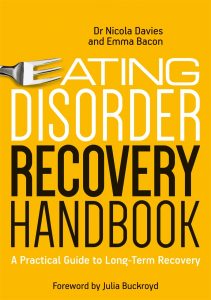 Dr. Nicola Davies, co-author of Eating Disorder Recovery Handbook, discusses the benefits of a holistic approach to recovery and what questions you need to answer before beginning your journey.
Dr. Nicola Davies, co-author of Eating Disorder Recovery Handbook, discusses the benefits of a holistic approach to recovery and what questions you need to answer before beginning your journey.
Many people suffer from eating disorders and often they do so in secret. Living with an eating disorder like anorexia, bulimia, or binge eating disorder can be an extremely isolating experience, which can deplete your self-esteem and confidence, distort your concept of health and body image, and make you forget what is truly important in life.
Recognising that you have a problem with an eating disorder is an important first step, followed closely by the acknowledgement that you need help and you need to open up about the problem to someone you trust. In recovering from an eating disorder, you will need to go through several stages, which can take a lot of time and energy. Rates of recovery will be different for everyone and there may be times you will return to unhealthy eating and dieting behaviours. It’s easy to perceive this as a sign of failure and lose confidence in moving forward, but it’s important to keep focused on positive change.
So, what does it take to achieve recovery from an eating disorder? Although eating disorders are linked with unhealthy eating, dieting and exercise practices, overcoming them takes a whole lot more than changing what you eat and normalising your weight. Eating disorders often spring from a very deep emotional pain and are associated with other conditions such as depression, personality disorders, and obsessive behaviours. This means that long lasting recovery from an eating disorder involves the strict re-alignment of your entire life – dealing with the past, living in the present, and navigating the future.
People currently struggling with an eating disorder who truly seek to live a happier and healthier life should consider adopting a holistic approach to treatment. Rather than just looking at the condition as an area of your life that can be dealt with in isolation, a holistic approach will encourage you to reflect on the intertwined aspects of your life, which will enable you to confront the condition head on. Specifically, a holistic approach urges you to think about how your eating disorder has been influenced by, and now affects, various aspects of your life. Some of the questions you could benefit from exploring in your journey towards recovery include:
o Physical: What is your image of a perfect body and how has this image influenced the development of your eating disorder? How has the eating disorder affected your exercise regimen and your concept of a healthy body?
o Nutritional: What is the role of food in your life? How has your diet affected the health of your organs and organ systems? How can you start to embrace and even enjoy the benefits of a balanced, varied diet?
o Cognitive: What belief system do you think has influenced the development of your eating disorder? How can you identify and address some of your unhealthy thinking patterns? What do you think is the role of mindful living in recovery?
o Emotional: How is your eating disorder associated with the way you handle your emotions? What are the emotions and experiences that trigger eating disorder behaviours?
o Behavioural: How do you respond to food and social gatherings? How do you react to stressful situations?
o Social: How has your eating disorder affected your personal relationships? How can those who care about you reach out to you and vice versa to take you out of isolation? What is the role of your family and friends during recovery?
Developing an eating disorder is often due to very powerful, negative feelings, thoughts and experiences that are difficult to deal with. Therefore, communication will play a key role in your recovery – communication with other people and with yourself. Asking the questions above can help you start an internal conversation, which will make your reflections more meaningful, help you confront some of your deepest fears, emotions and thoughts, guide your goal setting, and motivate you to actively change your behaviour for the better.
Throughout recovery, you will realise that getting over an eating disorder is about rebuilding who you are with a more positive focus and state of mind. It will be a journey about learning to take charge of the aspects of your life that are within your control and accepting those that are beyond your control. And in rediscovering yourself – your identity, purpose, dreams and aspirations – you can start to focus your energy on a healthier way of living.
If you would like to read more articles like Nicola’s and hear the latest news and offers on our books, why not join our mailing list? We can send information by email or post as you prefer. Please also tell us about your areas of interest so we can send the most relevant information. You can unsubscribe at any time.
Could i join yre mailing list please.
Hi Barbara,
Yes, of course, do sign up here: http://intl.jkp.com/mailing
Best wishes,
JKP
This is so great. I had an eating disorder when I was a kid. I am so glad I came thru it. Thanks for sharing this.